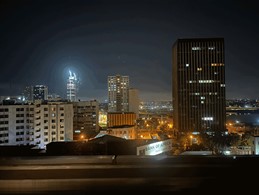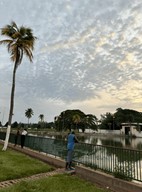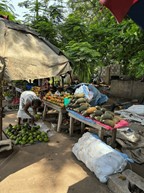By Anna
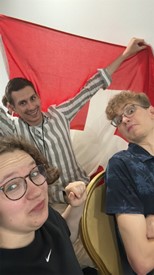 This year I was elected to represent my youth organisation at the congress of the International Federation of Liberal Youth in the Ivory Coast.
This year I was elected to represent my youth organisation at the congress of the International Federation of Liberal Youth in the Ivory Coast.
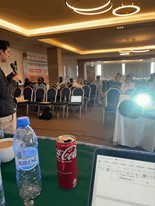 There were young people from all over the world – including Israel, Western and Muslim countries. Therefore, it wasn’t surprising that the views on the Israel-Hamas conflict were a major point of contention among the delegates. However, I noticed that there was no dialogue between the two sides when it came to debating the resolution on the Israel-Hamas conflict. Each side presented its arguments and presented their amendments. The only thing that mattered to them was who had the majority of the votes to get their way. But once the pro-Israeli side got its way, nothing had changed. Most of the Muslim delegates still saw Israel as pure evil and the Western delegates saw them as stupid for spreading propaganda about Israel. That’s why I came to the conclusion that I needed to learn more than just the facts about this conflict and delve into the different experiences of the conflict in order to understand the other side better. And hopefully I’ll be able to write a resolution on the Israeli-Hamas conflict for the next congress that will unite IFLRY.
There were young people from all over the world – including Israel, Western and Muslim countries. Therefore, it wasn’t surprising that the views on the Israel-Hamas conflict were a major point of contention among the delegates. However, I noticed that there was no dialogue between the two sides when it came to debating the resolution on the Israel-Hamas conflict. Each side presented its arguments and presented their amendments. The only thing that mattered to them was who had the majority of the votes to get their way. But once the pro-Israeli side got its way, nothing had changed. Most of the Muslim delegates still saw Israel as pure evil and the Western delegates saw them as stupid for spreading propaganda about Israel. That’s why I came to the conclusion that I needed to learn more than just the facts about this conflict and delve into the different experiences of the conflict in order to understand the other side better. And hopefully I’ll be able to write a resolution on the Israeli-Hamas conflict for the next congress that will unite IFLRY.
After the conference we were also able to travel around the Ivory Coast and that was when the real learning began. Before starting this trip, I had never been to Africa and had only learnt about Africa at school in the context of poverty and hunger. But this trip gave me a completely different picture of Africa.
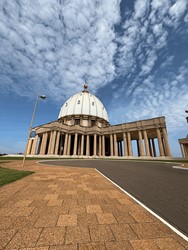 With some friends I made at the conference, I went to Yamoussoukro, which has a smaller population than Abidjan, the capital of the Ivory Coast. This is because the former president wanted to make his home village the capital, but failed miserably. Today the city has about 200,000 inhabitants, while Abdijan has about 6 to 7 million. He also built a palace with a huge garden around it. He also chose three crocodiles for the bridge in his garden. And you won’t believe what I’m going to tell you next! The crocodiles have already killed three people: A caretaker, a tourist and a local man who killed himself after the president’s death.
With some friends I made at the conference, I went to Yamoussoukro, which has a smaller population than Abidjan, the capital of the Ivory Coast. This is because the former president wanted to make his home village the capital, but failed miserably. Today the city has about 200,000 inhabitants, while Abdijan has about 6 to 7 million. He also built a palace with a huge garden around it. He also chose three crocodiles for the bridge in his garden. And you won’t believe what I’m going to tell you next! The crocodiles have already killed three people: A caretaker, a tourist and a local man who killed himself after the president’s death.
It was all very surreal – especially when I learned that once that wasn’t enough for the former president, he decided to also build one of the largest cathedrals in the world. As I stood on the roof of the cathedral, it seemed even bigger because it was surrounded by very small wooden houses.
On top of that, a local man told us that the local population is still glorifying the former president. At first I couldn’t understand it, as I thought the place and the cathedral were a complete waste of money. But then I tried to put myself in the place of an Ivorian and I began to understand that the president was someone they looked up to and, at least in their opinion, tried to improve their surroundings.
What also surprised me were all the traces of French colonialism that you can still find there. Firstly, they still speak French. Secondly, driving around Abidjan, I saw a lot of French companies, like Canon or a French supermarket chain. Due to that, the Ivorian economy wouldn’t survive without French ‘support’. Finally, the road signs in Côte d’Ivoire are the same as in France. The traces of colonialism are almost everywhere, if you look closely enough.
Today, when I think of Côte d’Ivoire, I don’t think of poverty and misery, but of the hard-working woman who sells coconuts all day with her child on her back. I think of the liberal Ivorian who was our tour guide but also founded a start-up company. I think about the beauty of the country and the memories I made there.
